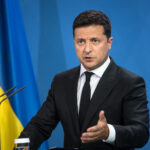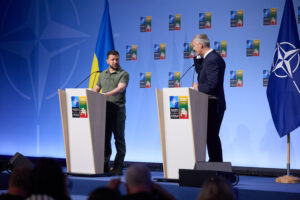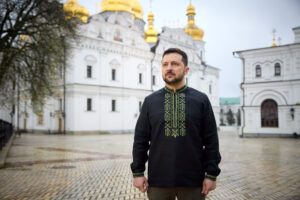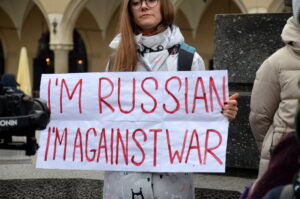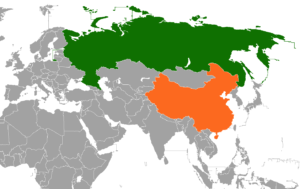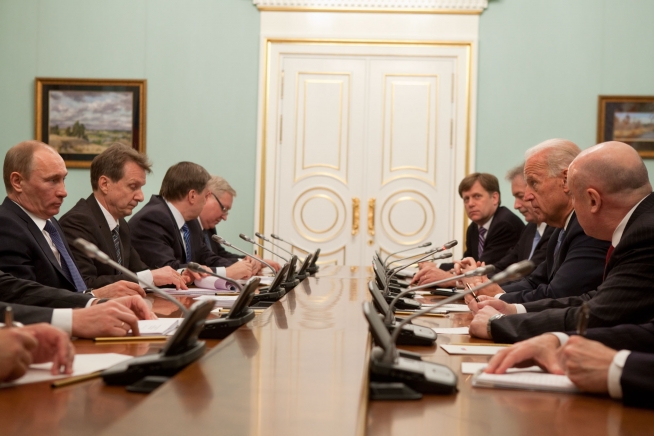
In the context of today’s Ukrainian crisis, pro-Russian commentators and some other American voices remind us of America’s role in the Cuban crisis to justify Putin’s current demands on Washington regarding Ukraine. They cite the American Munroe Doctrine as America’s equivalent to modern-day Russia’s insistence on maintaining a sphere of influence over Eastern Europe.
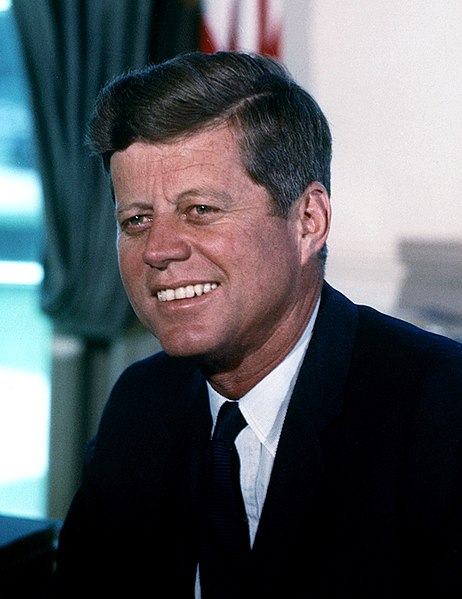
In 1962 after the failed Bay of Pigs Cuban invasion initiated by the U.S. government with the help of anti-Castro Cubans from the United States, President John F. Kennedy was faced with a crisis involving the USSR that was sending nuclear missiles to Cuba. American spy planes flying over Cuba detected the construction of Soviet-style nuclear facilities on the Cuban island. Kennedy laid down an ultimatum to force the Soviet Union to withdraw those nuclear missiles. Secretary-General Nikita Khrushchev relented and ultimately withdraw the nuclear warheads.
To start with, it may help to set the record straight on the relevance of the Munroe Doctrine to the conflict between Russia and the U.S. at this moment. The Munroe Doctrine was proclaimed by President James Monroe in 1823. It was a doctrine adopted to stop the spread of colonialism in the American hemisphere, and very much tied to 19th-century thinking in that regard. The doctrine became a mainstay of U.S. foreign policy, laying the groundwork for U.S. expansionist and interventionist practices in the decades to come.
Monroe made four basic points: (1) the United States would not interfere in European affairs; (2) the United States recognized and would not interfere with existing colonies in the Americas; (3) the Western Hemisphere was closed to future colonization; and (4) if a European power tried to interfere with any nation in the Americas, that would be viewed as a hostile act against the United States. The Doctrine indeed was referred to by President Kennedy in the context of the Cuban Missile Crisis to block the Soviet Union from introducing nuclear missiles into Cuba. However, even back then the doctrine was largely outdated and no longer of much relevance to American foreign policy. For example, despite the doctrine, today the U.S. is heavily involved in European affairs, such as in NATO. Former European colonies in the Americas have long since gained their independence. Furthermore, there is more danger that countries like China will interfere with nations in the Americas than European powers. What is more, modern-day Russia is not traditionally regarded as a European power per se.
As for the relevance of America’s views regarding the Cuban Missile Crisis, to start with, Cuba never posed any real threat to America. By comparison, it could have been claimed that before the Budapest Agreements, Ukraine with an arsenal of 5000 nuclear missiles, could have posed a threat to that country. If anything, however, Ukraine’s surrender of its nuclear arsenal guaranteed Russia’s security. Indeed, this is the first time in history that Ukraine as a former nuclear power is now being blackmailed to submit to the whims of Russia as the country to which it surrendered its nuclear arsenal for the sake of peace.
What is more, unlike in the Cuban missile crisis where America had never made any promises to respect Cuba’s sovereignty per se, in the case of Russia’s invasion of Ukraine, Russia made multiple promises to respect Ukraine’s territorial integrity and sovereignty — all the way from the Charter of Paris for a New Europe, the Charter for European Security, the Helsinki Final Act, the Helsinki Final Act to the Budapest Memorandum.
It is important to distinguish between the USSR which in 1962 was a totalitarian regime seeking to extend its imperial interests abroad, and the United States which was a democracy and, albeit imperfectly, respected the rule of law and sought to support others with the same values. Given a choice between life under Soviet rule and life with the support of their country by America, few would have chosen the USSR. This is an important distinction between the two powers because until Ukraine’s independence in 1991, it had been oppressed by Tsarist Russia and thereafter under Russian-dominated Soviet rule for over 300 years. During those 300 years, Ukrainians faced multiple wars, hunger, famine, genocide, executions, exile, the Gulag and concentration camps. In the face of those experiences, Russia’s claim to be concerned about its security in regard to a non-nuclear Ukraine today is pure irony.
Indeed, the former republics of the USSR declared their independence when the Soviet Union collapsed. That union which was forced upon them, as it was on Ukraine, no longer exists and they are now independent countries. Russia has no right to dictate to any of these countries now how they should conduct their foreign policy or what they should do to safeguard their security. Any attempt to do so is an unwelcome attempt to reverse their histories and reinstate the Russian empire.
What is more, America’s attempt to overthrow Fidel Castro in Cuba ended in failure and the withdrawal of American-sponsored troops. In short, apart from that effort, America never ruled Cuba. Meanwhile, as already mentioned, Russia ruled Ukraine for 300 years before its invasion, and in 2014 again successfully invaded Ukraine killing over 13,000 Ukrainians and displacing over 1.5 million people because of its war. Seven years later, Russian soldiers still occupy Crimea and are in the Donbas.
In short, there is little to be gained to compare the Cuban Missile Crisis of 1962 to today’s Ukrainian crisis and the argument deserves to be dismissed in the context of discussions between the officials of Russia and the U.S. during the next few weeks.
Andy J. Semotiuk is a U.S. and Canadian lawyer and a member of the New York and California bars in the U.S. and Ontario and B.C. bars in Canada. A former U.N. Correspondent stationed in New York, Mr. Semotiuk was also a former member of the Canadian Human Rights Commission’s Tribunal Panel. He is currently the President of the Centre for Eastern European Democracy. For more see www.CEEDWEB.ca.
